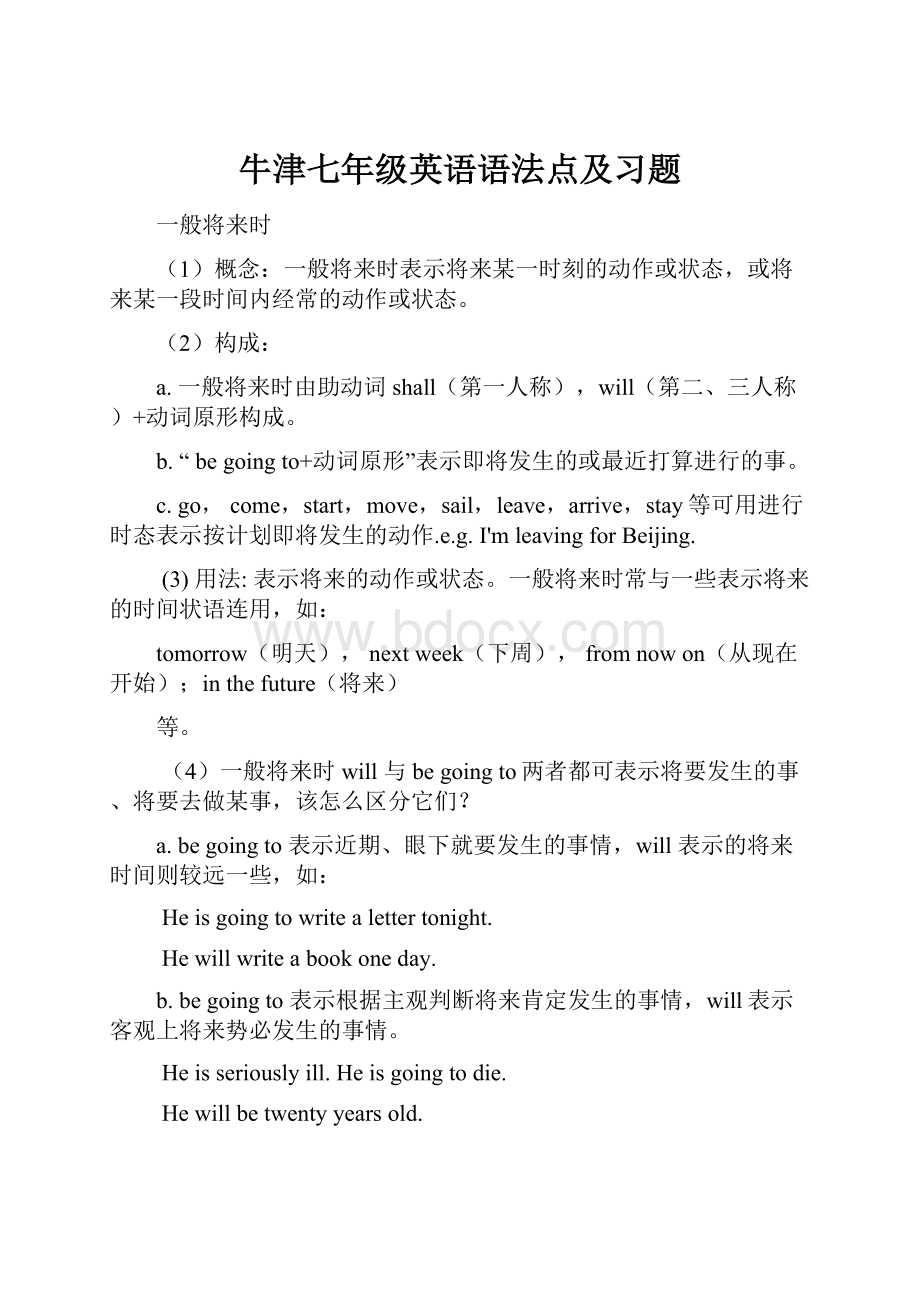牛津七年级英语语法点及习题.docx
《牛津七年级英语语法点及习题.docx》由会员分享,可在线阅读,更多相关《牛津七年级英语语法点及习题.docx(55页珍藏版)》请在冰豆网上搜索。

牛津七年级英语语法点及习题
一般将来时
(1)概念:
一般将来时表示将来某一时刻的动作或状态,或将来某一段时间内经常的动作或状态。
(2)构成:
a.一般将来时由助动词shall(第一人称),will(第二、三人称)+动词原形构成。
b.“begoingto+动词原形”表示即将发生的或最近打算进行的事。
c.go,come,start,move,sail,leave,arrive,stay等可用进行时态表示按计划即将发生的动作.e.g.I'mleavingforBeijing.
(3)用法:
表示将来的动作或状态。
一般将来时常与一些表示将来的时间状语连用,如:
tomorrow(明天),nextweek(下周),fromnowon(从现在开始);inthefuture(将来)
等。
(4)一般将来时will与begoingto两者都可表示将要发生的事、将要去做某事,该怎么区分它们?
a.begoingto表示近期、眼下就要发生的事情,will表示的将来时间则较远一些,如:
Heisgoingtowritealettertonight.
Hewillwriteabookoneday.
b.begoingto表示根据主观判断将来肯定发生的事情,will表示客观上将来势必发生的事情。
Heisseriouslyill.Heisgoingtodie.
Hewillbetwentyyearsold.
c.begoingto含有“计划,准备”的意思,而will则没有这个意思,如:
Sheisgoingtolendusherbook.
Hewillbehereinhalfanhour.
d.在有条件从句的主句中,一般不用begoingto,而多用will,如:
Ifanybeastscomesatyou,I'llstaywithyouandhelpyou.
考点
考点1:
“主将从现”(在时间和条件状语从句中,主句用一般将来时,从句用一般现在时)。
考点2:
arrive,come,go,leave,start等,用现在进行时的形式表示将来时。
如:
IamleavingforBeijingtomorrow.
考点3:
“祈使句+and/or+句子”,在这种结构中,and后面的句子谓语用一般将来时。
如:
Useyourheadandyouwillfindaway.
考点4:
回答“Don’tforgettodosth.”时,常用答句:
“Sorry,Iwon’t.”
考点5:
祈使句+反意疑问句部分(willyou?
).
考点6:
am/is/aregoingto+动词原形,表示打算要做的事或可能要发生的事。
考点7:
Thereisgoingtobeasportsmeeting.“将有场运动会。
”
专项练习:
()1.There__________ameetingtomorrowafternoon.
A.willbegoingtoB.willgoingtobe
C.isgoingtobeD.willgotobe
()2.Charlie________herenextmonth.
A.isn’tworkingB.doesn’tworking
C.isn’tgoingtoworkingD.won’twork
()3.He________verybusythisweek,he________freenextweek.
A.willbe;isB.is;isC.willbe;willbeD.is;willbe
()4.There________adolphinshowinthezootomorrowevening.
A.wasB.isgoingtohaveC.willhaveD.isgoingtobe
()5.–________you________freetomorrow?
–No.I________freethedayaftertomorrow.
A.Are;goingto;willB.Are;goingtobe;will
C.Are;goingto;willbeD.Are;goingtobe;willbe
()6.Mother________meanicepresentonmynextbirthday.
A.willgivesB.willgiveC.givesD.give
()7.–ShallIbuyacupofteaforyou?
–________.(不,不要。
)
A.No,youwon’t.B.No,youaren’t.
C.No,pleasedon’t.D.No,please.
()8.–Whereisthemorningpaper?
–I________ifforyouatonce.
A.getB.amgettingC.togetD.willget
()9.________aconcertnextSaturday?
A.TherewillbeB.WilltherebeC.TherecanbeD.Thereare
()10.Iftheycome,we________ameeting.
A.haveB.willhaveC.hadD.wouldhave
()11.He________herabeautifulhatonhernextbirthday.
A.givesB.gaveC.willgivingD.isgoingtogiving
()12.He________tousassoonashegetsthere.
A.writesB.haswrittenC.willwriteD.wrote
(13.He________inthreedays.
A.comingbackB.cameback
C.willcomebackD.isgoingtocomingback
()14.Ifit________tomorrow,we’llgoroller-skating.
A.isn’trainB.won’trainC.doesn’trainD.doesn’tfine
()15.–WillhisparentsgotoseetheTerraCottaWarriorstomorrow?
–No,________(不去).
A.theywilln’t.B.theywon’t.C.theyaren’t.D.theydon’t.
()16.Who________we________swimmingwithtomorrowafternoon?
A.will;goB.do;goC.will;goingD.shall;go
()17.We________theworkthiswaynexttime.
A.doB.willdoC.goingtodoD.willdoing
()18.Tomorrowhe________akiteintheopenairfirst,andthen________boatinginthepark.
A.willfly;willgoB.willfly;goes
C.isgoingtofly;willgoesD.flies;willgo
()19.Thedayaftertomorrowthey________avolleyballmatch.
A.willwatchingB.watches
C.iswatchingD.aregoingtowatch
()20.There________abirthdaypartythisSunday.
A.shallbeB.willbe
C.shallgoingtobeD.willgoingtobe
()21.They________anEnglisheveningnextSunday.
A.arehavingB.aregoingtohave
C.willhavingD.isgoingtohave
()22.________you________freenextSunday?
A.Will;areB.Will;beC.Do;beD.Are;be
()23.He________thereattentomorrowmorning.
A.willB.isC.willbeD.be
()24.________yourbrother________amagazinefromthelibrary?
A.Are;goingtoborrowB.Is;goingtoborrow
C.Will;borrowsD.Are;goingtoborrows
()25.–ShallIcomeagaintomorrowafternoon?
–________(好的).
A.Yes,pleaseB.Yes,youwill.
C.No,please.D.No,youwon’t.
()26.It________theyearofthehorsenextyear.
A.isgoingtobeB.isgoingtoC.willbeD.willis
()27.________openthewindow?
A.WillyoupleaseB.Pleasewillyou
C.YoupleaseD.Doyou
()28.–Let’sgoouttoplayfootball,shallwe?
–OK.I________.
A.willcomingB.begoingtocome
C.comeD.amcoming
()29.It________usalongtimetolearnEnglishwell.
A.takesB.willtakeC.spendsD.willspend
()30.Thetrain________at11.
A.goingtoarriveB.willbearrive
C.isgoingtoD.isarriving
答案:
1.C2.D3.D4.D5.D6.B7.C8.D9.B10.11.D12.C13.C14.C
动词填空
1.I______(leave)inaminute.I______(finish)allmyworkbeforeI______(leave).
2.—Howlong_____you_____(study)inourcountry?
—I_____(plan)tobehereforaboutonemoreyear.
—I_____(hope)tovisittheotherpartsofyourcountry.
—What______you______(do)afteryou______(leave)here?
—I______(return)homeand______(get)ajob.
3.I______(be)tired.I______(go)tobedearlytonight.
4.Mary’sbirthdayisnextMonday,hermother_____(give)herapresent.
答案:
1.amlearning;wellfinish;;leave2.will;study;plan;hope;will;do;leave;willreturnget;3.am;willgo;4.willgive
真题演练:
1(北京中考)Shewillhaveaholidayassoonasshe___theworknextweek.
A.finishesB.doesn’tfinishC.willfinishD.won’tfinish
2(江苏扬州中考)-Youforgottomakethebed.
-Oh,soIdid.____anddoitatonce.
A.I’llgoB.I’vegoneC.IgoD.I’mgoing
Keys:
1.A2.A
情态动词:
情态动词有can(could),may(might),must,haveto,shall(should,will(would),dare(dared),need(needed),oughtto等。
情态动词无人称和数的变化;不能单独使用,必须与其后的动词原形构成谓语
一、can,could
1)表示能力(体力、知识、技能)。
Canyouliftthisheavybox?
(体力)
Marycanspeakthreelanguages.(知识)
Canyouskate?
(技能)
此时可用beableto代替。
Can只有一般现在时和一般过去式;而beableto则有更多的时态。
I’llnotbeabletocomethisafternoon.
当表示“经过努力才得以做成功某事”时应用beableto,不能用Can。
如:
Hewasabletogotothepartyyesterdayeveninginspiteoftheheavyrain.
2)表示请求和允许。
-----CanIgonow?
-----Yes,youcan./No,youcan’t.
此时可与may互换。
在疑问句中还可用could,
might代替,不是过去式,只是语气更委婉,不能用于肯定句和答语中。
----CouldIcometoseeyoutomorrow?
----Yes,youcan.(No,I’mafraidnot.)
3)表示客观可能性(客观原因形成的能力)。
They’vechangedthetimetable,sowecangobybusinstead.
Thishallcanhold500peopleatleast.
4)表示推测(惊讶、怀疑、不相信的态度),用于疑问句、否定句和感叹句中。
Canthisbetrue?
Thiscan’tbedonebyhim.
Howcanthisbetrue?
二、may,might
1)表示请求和允许。
might比may语气更委婉,而不是过去式。
否定回答时可用can’t
或mustn’t,表示“不可以,禁止”。
----Might/MayIsmokeinthisroom?
----No,youmustn’t.
----May/MightItakethisbookoutoftheroom?
----Yes,youcan.(No,youcan’t/mustn’t.)
用MayI...?
征徇对方许可时比较正式和客气,而用CanI...?
在口语中更常见。
2)用于祈使句,表示祝愿。
Mayyousucceed!
3)表示推测、可能性(不用于疑问句)。
might不是过去式,它所表示的可能性比may小。
1.Hemay/mightbeverybusynow.
2.Yourmothermay/mightnotknowthetruth.
三、must,haveto
1)表示必须、必要。
Youmustcomeintime.
在回答引出的问句时,如果是否定的,不能用mustn’t(禁止,不准),而用needn’t,don’thaveto(不必).
----Mustwehandinourexercisebookstoday?
----Yes,youmust.
----No,youdon’thaveto/youneedn’t.
2)must是说话人的主观看法,而haveto则强调客观需要。
Must只有一般现在时,haveto有更多的时态形式。
1.heplayisn’tinteresting,Ireallymustgonow.
2.IhadtoworkwhenIwasyourage.
3)表示推测、可能性(只用于肯定的陈述句)
1.You’reTom’sgoodfriend,soyoumustknowwhathelikesbest.
2.Yourmothermustbewaitingforyounow.
专项练习:
1.—IsJohncomingbytrain?
—Heshould,buthe________not.Helikesdrivinghiscar.
A.must B.can C.need D.may
2.—Theroomissodirty.________we cleanit?
—Ofcourse.
A.WillB.ShallC.WouldD.Do
3.MyEnglish-Chinesedictionaryhasdisappeared.Who________havetakenit?
A.shouldB.mustC.couldD.would
4.—Iheardtheywentskiinginthemountainslastwinter.
—It________truebecausetherewaslittlesnowthere.
A.maynotbeB.won’tbeC.couldn’tbeD.mustn’tbe
5.Ithasbeenannouncedthatcandidates________remainintheirseatsuntilallthepapershavebeencollected.
A.canB.willC.mayD.shall
6.—Therewerealreadyfivepeopleinthecarbuttheymanagedtotakemeaswell.—It________acomfortablejourney.
A.can’tbeB.shouldn’tbeC.mustn’thavebeenD.couldn’thavebeen
答案:
1.D2.B3C4.C5.D6.A
☆can与beableto的区别
(1)can表示“能力”时,和beableto相当,许多场合都可以互相替换。
但当叙述过去经过一番努力才能完成的事情或前面有特殊说明,表示你有能力时,只能用beableto。
【正】Canyouspeakanyforeignlanguages?
你会说外语吗?
【正】Areyouabletospeakanyforeignlanguages?
你会说外语吗?
【误】Thefirespreadthebuildingquicklybuteverybodycouldescape.
【正】Thefirespreadthebuildingquicklybuteverybodywasabletoescape.
大火迅速蔓延到整幢大楼,但大家都逃了出来。
【正】Thefirespreadthebuildingquicklybuteverybodymanagedtoescape.
大火迅速蔓延到整幢大楼,但大家都想法逃了出来。
(2)beableto比can有更多形式。
Noonecouldanswerthequestion.
没人能回答这个问题。
(这里could可用wasableto代替)
Whenhegrowsup,hewillbeabletosupporthisfamily.
他长大后就能养家了。
Frankisill.Hehasn'tbeenabletogotoschoolforoneweek.
弗兰克病了,已经一周没去上学了。
I'msorryfornotbeingabletohelpyouintime.
对不起,不能及时帮你的忙。
(3)could经常和动词see,hear,smell,taste,feel,remember,understand等连用。
Whenwewentinto